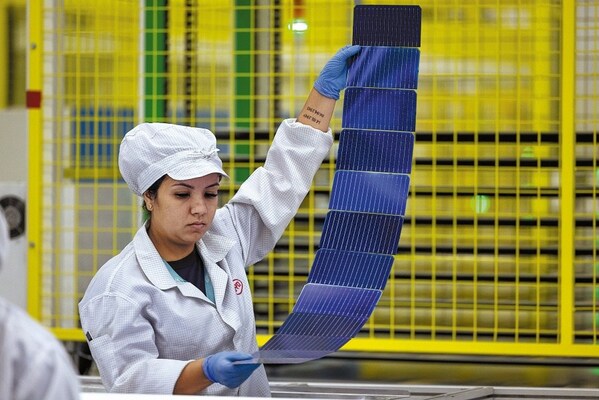2024-11-20 chinadaily.com.cn HaiPress
BEIJING,Nov. 18,2024 -- A news report from chinadaily.com.cn:

A worker inspects photovoltaic cells at a solar panel and electric bus chassis production facility in Campinas,Sao Paulo state,Brazil,on Nov 14,2023.JONNE RORIZ/GETTY IMAGES
Brazil and China share a successful relationship which is deeply rooted in complementarities,mutual respect and mutual benefit. What we see today,especially after the record $105 billion bilateral trade in 2023,is the result of the progressive building of mutual trust and strategic understanding.
In our (Brazilian Center for International Relations') interactions with Chinese scholars and businesspeople,it has become clear that there is complementarity between the two economies,manifested in crucial sectors such as agriculture,energy and technology.
Chinese investment in Brazil has been significant and strategic over the past decade,contributing to industrial and technological development. The presence of Brazilian companies and interests in China is also strong,as attested to by the size of the delegation of more than 200 people from different sectors that accompanied Brazilian President Luiz Inacio Lula da Silva's visit to China in 2023.
The last few years have been particularly transformative for the bilateral relationship. At the Brazilian Center for International Relations (CEBRI),we have witnessed an increase in high-level visits and have led discussions around new opportunities and frontiers for cooperation,specifically in the technology and sustainability fields.
What makes the cooperation even more relevant is its multifaceted nature — the robust trade relationship is coupled with collaboration in areas such as space science and technology,5G and renewable energy.
The relationship has the potential to deepen. On the one hand,Brazil faces a significant infrastructure deficit,currently representing only 1 percent of GDP invested,when it should be 3 to 4 percent. That hinders economic development and raises costs.
Given that China seeks foreign investment opportunities,Brazil's infrastructure development is a priority that could act as a lever to enhance efficiency. That improvement would particularly benefit the logistics of agricultural products and commodities exports and could be one of the benefits of Brazil joining the Belt and Road Initiative.
Another priority for the bilateral partnership is to support diversification and add value to Brazilian exports. The Brazilian Minister of Agriculture's announcement of the unprecedented qualification for export to China of 38 Brazilian meatpacking plants in a single round shows that there are significant recent developments in the trade relationship.
Brazil,however,with China's support,needs to be able to sell a wider range of products,not only agricultural and commodity goods but also industrial and manufactured products with higher value added (steel rather than iron ore,for example). So it is important to invest in the industrial sector and cooperate more on technology and research and development.
Moreover,Brazil and China have aligned interests in multilateral forums,especially on issues related to sustainable development and global governance reform. Experts from both countries discussed these issues recently at an event organized by CEBRI's China Analysis Group,demonstrating not only the maturing of the 50-year-old diplomatic relations but also the opportunities that can further arise.
President Xi Jinping's ongoing visit to Brazil could be a pivotal moment for Sino-Brazilian relations. The visit is taking place in a year when the two sides are celebrating the 50th anniversary of the establishment of Sino-Brazilian relations,and Brazil is hosting the all-important G20 Summit and has been selected to hold the 2025 UN Climate Change Conference (COP30) and the BRICS+ Summit.
The country's role as a leader in the provision of sustainable energy sources,food and bioeconomy products,carbon compensation mechanisms and critical goods such as minerals becomes more and more apparent.
Earlier this year,CEBRI organized,in conjunction with the Chinese Academy of Social Sciences,the"50 Years of the Brazil-China Relationship: Cooperation to a Sustainable World" conference,in which Brazilian Vice-President Geraldo Alckmin and the Chinese Ambassador to Brazil Zhu Qingqiao participated. The event showed the high potential for cooperation in the future.
The sustained diplomatic and stakeholder consultations we organized show there are key issues on which we should further collaborate,particularly in transformative sectors such as energy transition,digital transformation and investments in critical infrastructure and low-carbon agricultural practices.
And,as I stressed previously,investments in infrastructure,technology and innovation for industrialization are a requisite to tap into that potential.
As co-organizer of the Think 20,a major G20 engagement group,we have spoken with our Chinese counterparts and provided complementary insights for this partnership.
The Rio G20 Summit will be a forum for both nations to advance their shared vision for reforming global economic governance architecture. Discussions on challenges such as multilateral system renovation,development finance innovation,and technology-driven sustainable growth are particularly relevant in this context,as the India-Brazil-South Africa troika within the G20,and China's active engagement could strengthen the BRICS' and emerging countries' influence on the global order.
The convergence of Brazil's BRICS+ presidency and the upcoming COP30 in Belém do Pará create business and cooperation opportunities that are not to be missed.
We have rarely seen such a favorable alignment of agendas. Brazil now has the chance to position itself as a leader in sustainable development,which I see is increasingly appreciated by our Chinese partners.
The synergy between Brazilian and Chinese priorities on issues such as environmental protection,technological development and poverty eradication opens up space for transformative initiatives on a global scale.
The current moment requires a strategic vision that goes beyond traditional trade relations. There is enormous potential for cooperation that has yet to be explored.
Looking ahead,working together on increasing the value added of the products that are traded will be key,as well as investing at different levels of the value chain,including in the infrastructure needed to raise competitiveness.
This is a moment that demands pragmatism in the bilateral relationship,but also boldness in building a common agenda that benefits both countries' development and international projection.
The author Jose Pio Borges is chairman of the board of trustees of the Brazilian Center for International Relations.
The views don't necessarily represent those of China Daily.
If you have a specific expertise,or would like to share your thought about our stories,then send us your writings at opinion@chinadaily.com.cn,and comment@chinadaily.com.cn.